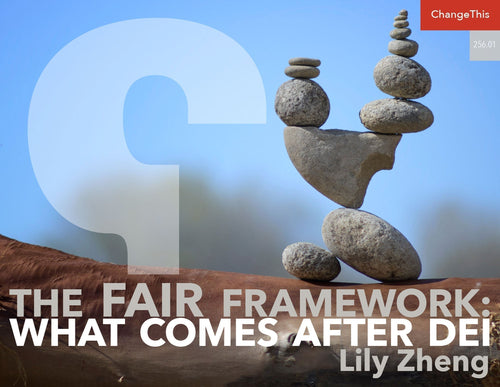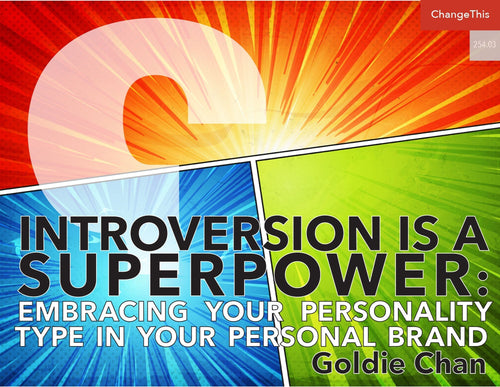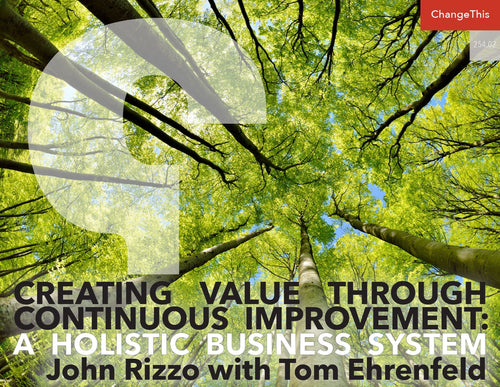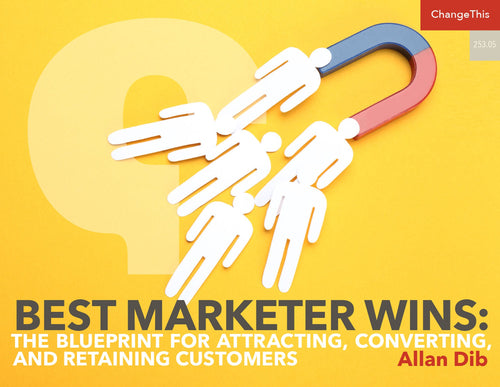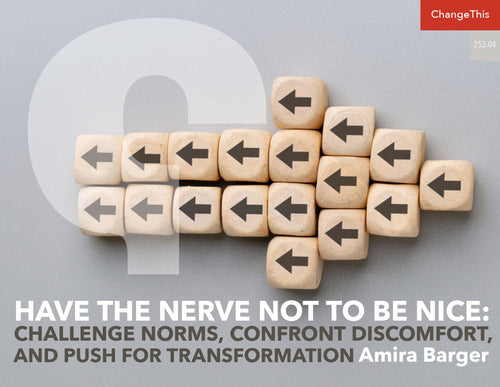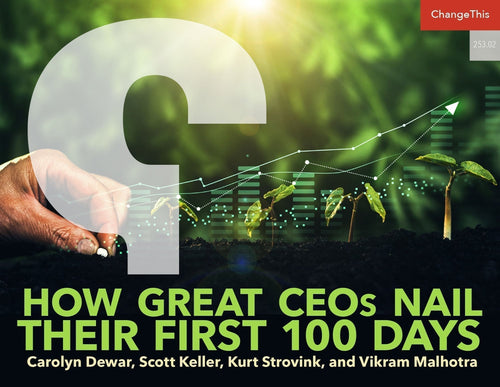How to Move from Just Making Money to Making a Difference
"One day, seemingly out of the blue, an unsettling whisper begins in our soul. First quietly, and then with a growing cadence. ‘Smoldering discontent’ is what I call it, and I experienced it firsthand."
There are a growing number of highly successful people out there who are arriving at a most unpredicted destination.
They have accomplished much in this life and, for the most part, seem to have need of nothing, at least in terms of material goods. Then, one day, seemingly out of the blue, an unsettling whisper begins in our soul. First quietly, and then with a growing cadence.
‘Smoldering discontent’ is what I call it, and I experienced it firsthand. It was the feeling that this is all there is and it’s not filling the void in my life that I thought it would.
You could’ve almost cued the Hitchcock music when it happened for me. There I was, standing in my 40th floor corner office, looking out over downtown Chicago from what most people would consider a pretty nice perch. I had achieved most all that I had ever dreamed of, which, at the time, mostly consisted of material things—cars, money, houses, prestige. I was an expert in my field and I knew how blessed and lucky I was to be there.
But then…that gnawing feeling began, first quietly, then a bit louder, and one day it became a roar. It was relentless. It began to make it difficult to fully enjoy all of the perks of success. I even foolishly thought that perhaps more toys and things would make it go silent. I was wrong.
I sometimes wondered: Is it just me? How can this be happening when things are going so well? It was all so counterintuitive that at first I felt like I shouldn’t tell anyone about it. It seemed too crazy, and even explaining it would be daunting.
When most of the world would trade places with me in a second, here I was uncomfortable and edgy and, truthfully not even sure exactly what was happening to me.
Then, a miracle happened. I learned that I was not the only one. And, in the decade or so since then, I have discovered a growing number of people who went through exactly what I went through. I met the author of the seminal and groundbreaking book on the subject, Bob Buford. He called it ‘halftime’ and when he defined it, I knew that was it. I was in it. But, what to do about it?
The Halftime Phenomenon
So, where does all of this restlessness come from? It is the product of a perfect storm of better medicine and the kind of work most of us do every day. Think about it, since most of us are knowledge workers, we are likely going to live considerably longer lives. In fact, most of us will have another 30 years or more after the time that the previous generation was retiring and sailing off into the sunset with the gold watch. And, here’s the kicker: those extra 30 years could turn out to be the most productive and satisfying years of our lives if we only figure out how to make the transition.
We begin the season of halftime with that feeling of smoldering discontent. But if we make the transition successfully into our second half, we emerge with a clear purpose, plan, and focus that will allow us to finish well and live a life of true significance.
Your Eightieth Birthday
Let’s fast forward to your eightieth birthday and someone has taken you to your favorite restaurant. Stepping through the front door, you see the entire place has been rented out for the occasion. Across a large room you see some two hundred family members, friends, and business associates. The room has a stage and a microphone.
After dinner, one by one, all of the guests—your spouse, your children, your neighbors, employees, associates—form a line to take the microphone and say to everyone what your life has meant to them and others.
What do you hope to hear?
This question came to me at a funeral I attended during my years at Wachovia Securities. I was there to support a woman at work who lost someone dear to her, but the deceased person was a stranger to me—unlike the other five hundred or so people crowded into the pews that day. Best I could tell, this woman had no wealth, no notoriety, no material possessions to speak of, none of the bragging points that people like me would have sacrificed entire families to gain. I said to a man next to me, “Who died, and why are all these people here?”
She was a teacher, he said. And I’m in her final classroom, I mused. No five hundred people would have shown up to mark my passing; that I knew. Of the few who might see me off, any one of them could step to a podium and pretty easily sum me up in just a few words: lucrative career, owned a lot of stuff, had a good time, was definitely into himself.
Everything about this funeral hit me like a punch in the solar plexus. Most of my life I’d bulked up for society’s scales. Now, on the measure that counts for everything, here was a real heavyweight. And it wasn’t me.
As you ponder those final commentaries on your life from the people who know you best, I would suggest that you ask yourself three questions:
- What is all your gaining costing you?
- What in your life has the greatest value and how do you protect it?
- If you were to reorder your life to finish well, what evidence would confirm that you were on the right track?
Question 1: What is all your gaining costing you?
At one Halftime Launch Event—the two-day kick start to a year-long Halftime journey here at the Halftime Institute—a well-known C-suite executive named “Bill” was there, who had headed a 40,000-employee US company. He’d come to evaluate his life and choices, and he was wise to do it in a sympathetic group because his career review came with pain. For decades Bill had given his best to his company, and no question it was thriving. The high cost of what he gave professionally, though, left bomb craters in the home that lay exposed, and in the lives of his kids and former wife. Now he was sixty-five years old, living in an Architectural Digest–worthy home, surrounded by thousands of acres of breathtaking mountain scenery, and mostly alone.
This is hardly an exceptional case. Relentlessly striving without any concern for those around you is a common occurrence. In fact, society reveres the hard-driving executive who works his way to the top, especially if he has built a great team at work. When you are doing that, everybody who is making money off of your efforts will most likely let you keep on doing it. They have a vested interest in your ‘success’, at least that particular definition of the word. I know because I have been on this treadmill myself.
Early in my own marriage, the drive toward my ideal net worth dinged my relationships with my wife, Lisa, and with our kids. Once, for example, Lisa had an opportunity in Chicago to act in participatory theater and I pooh-poohed it. “You’d miss my company Christmas party” I said. “And I’m the boss.” (It’s painful now to write that.)
I recently read a story in the Washington Post that said, “Harvard researchers discovered the one thing everyone needs for happier, healthier lives.” Care to guess what that one thing is?
Relationships.
Dr. Robert Waldinger, a Harvard psychiatrist, had taken over a seventy five-year study of a group of men, young adult through old age. His takeaway was that the happiest and healthiest participants “maintained close, intimate relationships.”
Waldinger says people who are lonely are less happy, their health declines earlier in midlife, their brain functioning declines sooner, and they live shorter lives than people in strong relationships. Then he added, “And good, close relationships seem to buffer us from the slings and arrows of getting old.” You’ll notice that a great relationship with all of your money wasn’t mentioned as a cure for this malady.
Enough said.
Question 2: What in your life is priceless? And what are you doing to protect it?
One man with a notable answer to this question is a Halftime Institute director who, once a week, devotes an entire day to his wife. On that day, they take walks, go sailing, see a movie, and play tennis. To the rest of us he’s unreachable.
Ouch, because, at the spinning Niewolny house, unless I’m deliberate, I’m good to give Lisa a moment, much less a day. Unless and until my assistant, Andrea, marks my calendar with my son’s games and my daughter’s recitals—and date nights with Lisa—family time is an afterthought.
Scheduling events is only part of protecting the priorities in my life, however. I also repeatedly have to comb through my calendar to remove nonessentials and create white space for (a) time to exhale, and (b) room to respond on short notice. I’m better now at opening white space, but as an achiever, wired to accomplish or do things, unspecified time still feels wrong to me. I say this even as I regret the years swallowed whole by my compulsions around my career—and even though I know the long-term payoff when I give my hours (including the down hours) to the people who are my life.
You must identify what is priceless and you must be diligent in protecting the time and resources required to preserve it.
Question 3: If you were finishing well, in a satisfying conclusion to the years that came before, what evidence would you have?
For me, evidence of my finishing well would show first in my family and with my wife in particular. Instead of our marriage drifting into coexistence because of my busy-ness, we’d be more in love, which means I’d kept our relationship a priority.
There’s a raft of research out there that proves life’s riches reside in people and purpose. One article I keep on file quotes the Mt. Sinai Health System’s statement that a life with purpose actually reduces death. Of course we are all going to die, but when? To quote from the Mt. Sinai report: “. . . a high sense of purpose is associated with a 23 percent reduction in death from all causes and a 19 percent reduced risk of heart attack, stroke, or the need for coronary artery bypass.” How about that? Purpose keeps us here longer.
Dr. Viktor Frankl, a brilliant Jewish psychiatrist, was swept into the Holocaust that scorched through Europe in the 1930s and ‘40s. Through several years in slave labor and in work or death camps, including Auschwitz, he witnessed firsthand and in the worst conditions what can keep humans alive.
He saw physically strong men give in, curl up like dry leaves and die.
He saw supposedly weaker men, prisoners he’d have judged as doomed, somehow hold on. Other things being equal, the difference was hope: whatever stirred meaning and purpose for that person.
Even in extreme conditions, people with a reason to live—a child to care for, a spouse maybe still alive, something required of them—could survive overwhelming odds.
In the camps, Dr. Frankl helped prisoners identify their purpose and somehow endure the hell. After the war he poured what he had learned, anonymously at first, into one of the twentieth century’s most important books, Man’s Search for Meaning.
When Tonight Show host Jimmy Fallon had an accident and nearly lost his ring finger, he took a week off the show to have surgery and recover. During his time off, he read, of all things, Man’s Search for Meaning. On his first evening back on TV, America’s premiere nighttime talk show host held up the little classic written seventy years ago and said, “The meaning of my life is I belong on TV and I should be talking to people … and if anyone’s suffering at all, this is my job. I’m here to make you laugh. … That’s why I’m here.”
Wherever you find people—in death camps or on talk shows, or in the ‘burbs—you can find the amazing, life-giving power of purpose. A Harvard study once said that among men and women ages fifty-five to sixty-five, more than 50 percent would change careers to gain greater purpose. We Homo sapiens come with a DNA-driven desire, a physical compulsion, to know why we exist and to act on it.
And the majority of us, however we define success, come to a time when success for its own sake pales next to the real trophies of true direction: our effects on other lives, a chance make a difference.
And it’s never too late, or too early, to get it.
What to Do if You’re in Halftime
If you are one of us, one of those people who are sure that there is much more for them to do with this extra 30 or so years they’ve been given, then there’s good news. Bob Buford’s book, Halftime: Moving from Success to Significance, struck a nerve, started a movement, and has sold almost a million copies since it published in 1995. Bob also launched the Halftime Institute to help guide ‘halftimers’ through the process of figuring out what’s next for them.
I have the privilege of being the CEO there. We’ve learned a lot over the past two decades about what works and what doesn’t. My new book, Trade Up, chronicles a lot of the new information gleaned from people who have gone through the halftime institute and found their second half mission.
While we can’t cover it all in great detail here, I would suggest these first steps:
- Contact the Halftime Institute. We can direct you to the right resources to get you started.
- Get a Coach. It’s interesting, isn’t it, that every great athlete has a coach. Here’s why: We all have blind spots. We need honest, unvarnished feedback. A good coach who has our best interest at heart is invaluable. And, we have to be humble enough to trust our coaches and act upon the feedback they give us.
- Pull together a Personal Board of Directors. Find friends who love you and care about what you are doing and meet with them on a regular basis to discuss your progress and possible next steps.
- Try some low cost probes. Don’t dive headfirst into the next thing. Put your toe in the water before you leave what you are doing now. In fact, the majority of our Halftime Institute alumni wind up staying in the work they are already doing, albeit with a different attitude and perspective on it all.
-
Take your family with you, especially your spouse. The halftime experience can look an awful lot like middle-aged crazy. Be candid and honest about what you are feeling and be transparent as you go through the process of finding your ideal second half.
Most importantly, get started. Your life isn’t over. In fact, in many ways it has just begun. There’s great work out there that needs your specific set of skills and talents.
Your best days are ahead of you. Believe that and get ready to finish well.
About the Author
Dean Niewolny is CEO of the Halftime Institute. Before that he spent 23 years in executive roles with three of Wall Street’s largest financial firms. In 2010, he left his marketplace career to help others who, like him, wanted to expand their own first half success and skills into passion and purpose for meeting human needs and having an impact. His latest book is Trade Up: How to Move from Just Making Money to Making a Difference.



